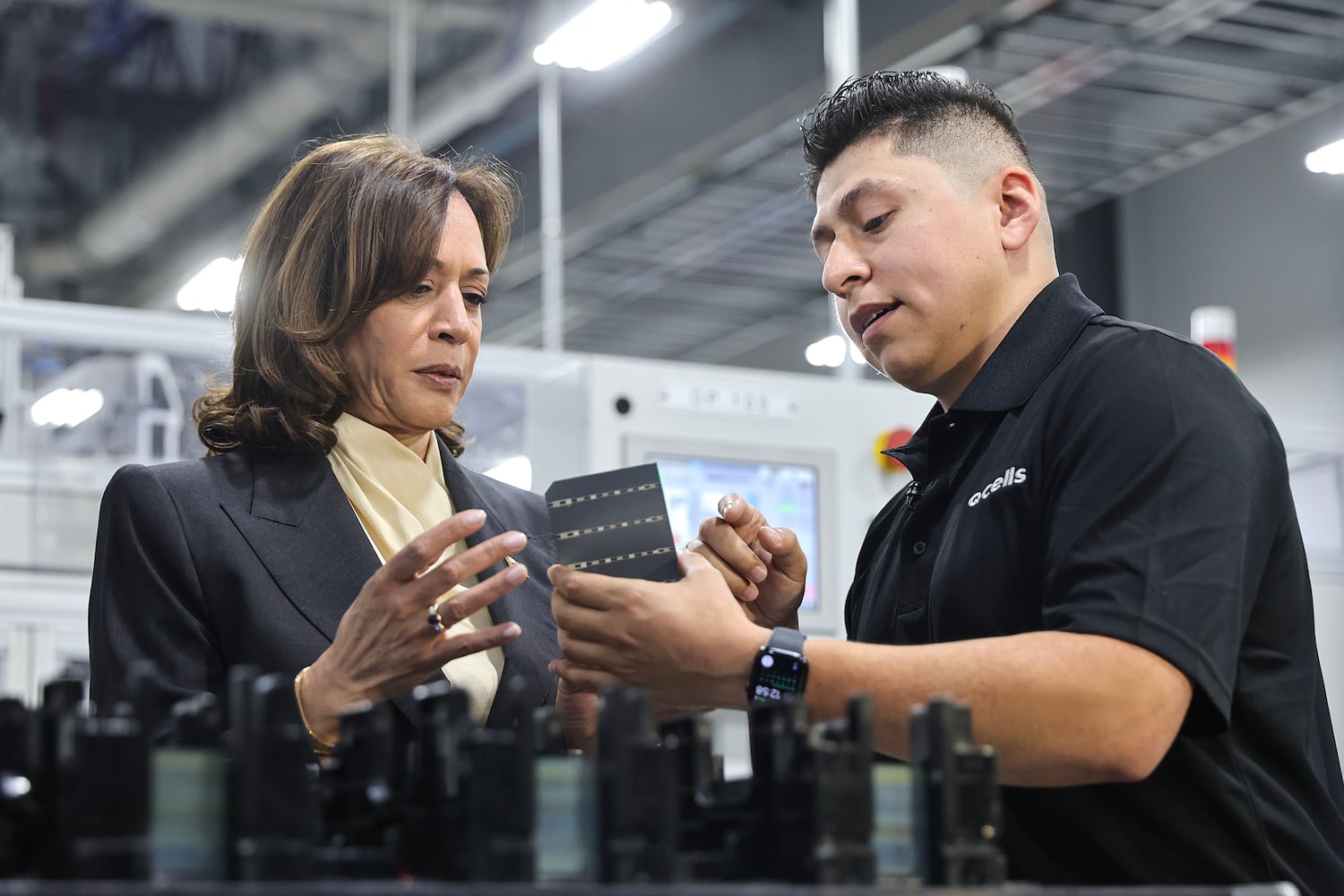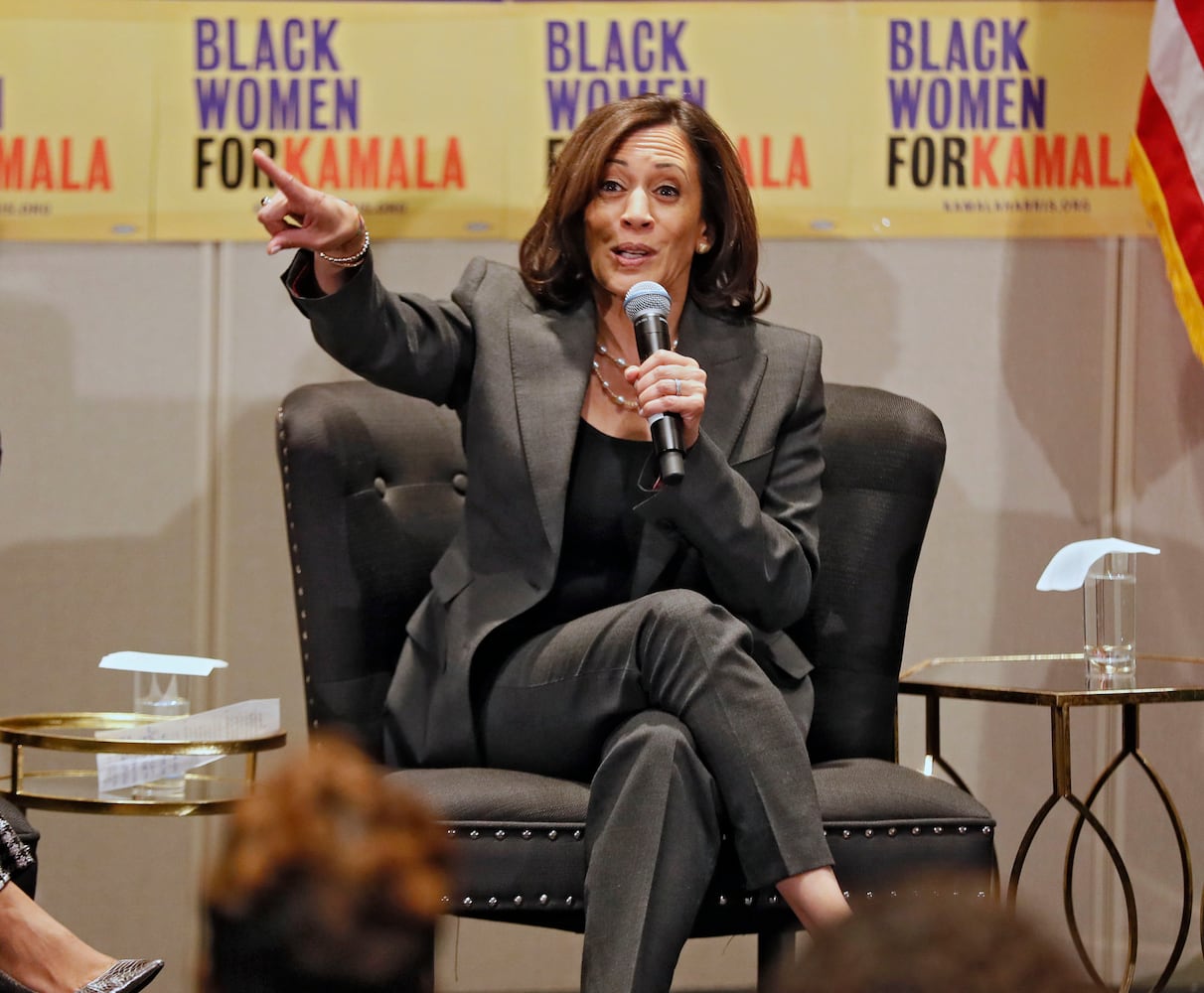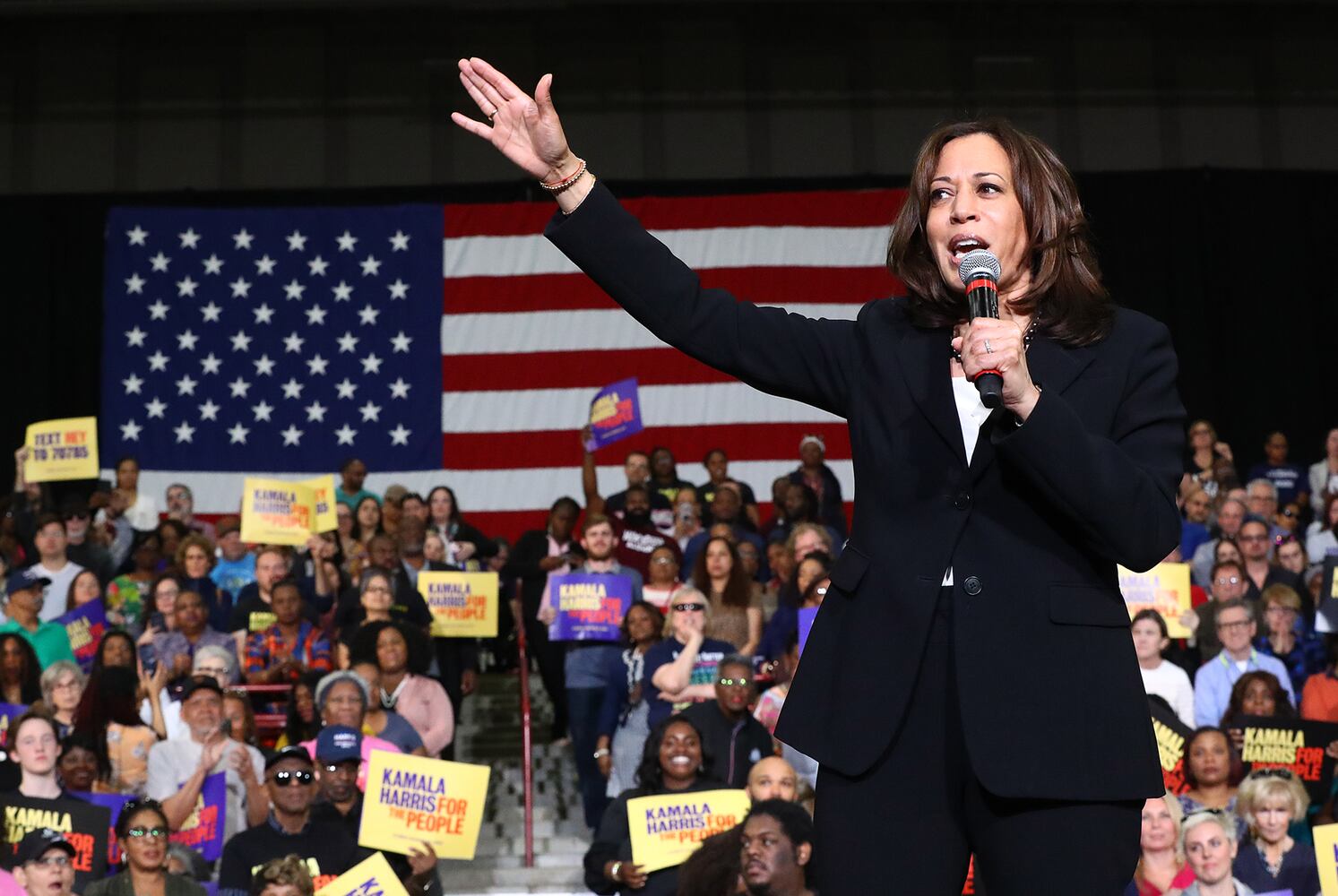When President Joe Biden was in Atlanta for the May commencement ceremonies for Morehouse College, he praised and teased the graduates of the all-male school telling them that he did not doubt that “a Morehouse Man will be president one day.”
The president let the applause build and die down a bit before delivering the punchline.
“Just after an AKA from Howard,” he quipped.
On Sunday, Biden laid the path for that member of Alpha Kappa Alpha Sorority from Howard University when he endorsed Vice President Kamala Harris to succeed him atop the Democratic Party’s ticket for the November presidential election.
Credit: Ben Gray
Credit: Ben Gray
In a statement, Harris thanked Biden for the endorsement and vowed to “earn and win this nomination.”
“We have 107 days until Election Day,” Harris wrote. “Together, we will fight. And together, we will win.”
‘The only decision’
If she is ultimately chosen, Harris would be the first African American woman, first Asian American woman, and first graduate of a historically Black college to lead a party’s ticket.
“Which is not unimportant,” said Kerry Haynie, a professor of political science at Duke University and dean of the school’s department of social sciences. “Having a woman of color at the top of the ticket sends a significant message when the other side has traded in race bating and xenophobia.”
In the weeks following President Biden’s Atlanta visit and his disastrous debate with Donald Trump, the loud whispers for Harris to replace him on the ticket grew, even as she downplayed it, refusing to engage in commentary about anything other than running alongside him.
But with Biden dropping out and strongly endorsing her, she now has no choice.
Neither did the list of prominent Democrats who are lining up to support her.
“It is the right decision, the only decision the Democrats could have made and have a chance of winning,” said Haynie, the co-author of “Race, Gender, and Political Representation: Toward a More Intersectional Approach. “It would have been too disruptive to not place Harris at the top of the ticket. A Black woman. A woman of color who is currently the vice president. They would have lost their base if it was someone other than Kamala Harris.”
Courting Black women
That base is Black women. Long considered the backbone of the Democratic Party, Black women will again play a major role in the November election.
Credit: arvin.temkar@ajc.com
Credit: arvin.temkar@ajc.com
In 2020, more than 91% of Black women who voted, supported the Biden-Harris ticket. And while some polls suggested that Biden was losing Black male voters, those same polls show that Black women were still fully behind him.
Silva Howard, who is visiting Atlanta from the battleground state of Michigan, said Harris has her full support.
“ (Black women) are the smartest people on the planet. For us to run the country would be amazing because we know what it takes to not only run a country but to run a family,” said Howard, before walking into the Janet Jackson concert Sunday night at State Farm Arena. “We are the backbone. The Black woman is the backbone of the United States.”
Haynie said with Harris now serving as the party’s presumptive nominee, the Democrats can move forward against the Republicans, rather than having been mired in the intraparty turmoil that has dominated the conversation over the last three weeks about whether Biden should step aside.
“Biden endorsing her was very important,” Haynie said. “They will get the party behind her. Now they must take advantage of the strong infrastructure they have put together to turn it into a Harris-led machine.”
Endorsements rolling in
Harris sought the Democratic Party’s presidential nomination in 2020, but dropped out before a single primary vote had been cast because her campaign lacked money, a message and a cohesive strategy. Even after Biden picked her to run as his vice president, her first two years of office were marked by missteps.
But after the Supreme Court decision overturning the right to abortion enshrined in Roe v. Wade, she became one of the most vocal and prominent advocates for abortion rights and women’s rights.
She was also Biden’s most ardent defender after his debate debacle, rallying around him when other high-profile Democrats called for him to step aside.
On Sunday, former President Bill Clinton and former Secretary of State Hillary Rodham Clinton, issued a statement on social media Sunday endorsing Harris.
So did Georgia Senators Raphael Warnock and Jon Ossoff, who were joined by Congresswoman Lucy McBath and former Atlanta Mayor and Biden adviser Keisha Lance Bottoms in endorsing Harris.
“They recognize the risks the party would undertake if they passed over Harris. Changing candidates will not erase Democrats’ current disadvantage relative to Donald Trump, and if it looked like Harris was passed over against her will, that would almost certainly depress Black voter turnout and guarantee that Democrats would lose the presidency,” said Emory University political scientist Andra Gillespie.
“We’ll have to wait to see if others submit their name for consideration in the next few days. In the meantime, the hard work begins of working through the DNC’s procedures to ensure a legal and optically sound transfer of the nomination.”
Moving with caution
Emory University law professor Alicia Hughes agrees that — with recent Supreme Court rulings, ballot certification deadlines, and the upcoming Democratic National Convention — the naming of Harris was the “most strategic and intelligent decision” that could have been made.
“It puts [the Democratic Party] in a position where they are able to ensure that they stay out of the courts,” Hughes said. “It ensures a modicum of consistency.”
But that is just the beginning.
Hughes said while the “path of least resistance,” is to have Harris at the top of the ticket, conversations are going on about who would be on the ticket with her or even if someone else should carry the party’s banner.
“The concern is who is in a position to beat the Republicans,” Hughes said. “Some people don’t think it is the vice president. Some think it could be (Michigan Gov.) Gretchen Whitmer or (California Gov.) Gavin Newsom. All of these are conversations going on in the background. There are many ways this can go. We are still in a bit of a conundrum right now. But this is politics.”
Kelly Green, a 1991 graduate of Howard, said she is supporting Harris, who she thinks is ably qualified to run for president.
But she is fearful that America might not be ready to embrace a woman, even one who could prevent former President Donald Trump — whom Democrats have branded as a threat to democracy because of his positions on guns, abortion, immigration, taxes, education and trade — from returning to the Oval Office.
Credit: Kelly Green
Credit: Kelly Green
“America is not ready to vote for a woman, let alone a Black woman,” said Green, who lives in Marietta. “We have been indoctrinated with too much self-hate into thinking that Black women can’t do the job when over and over again, it has been shown that Black women carry this democratic process. I am ready for the fight and willing to do whatever I need to do, but I think it is going to be very hard. I am very scared.”
Harris no stranger to Atlanta
During the campaign season, Harris visited Atlanta five times, including twice in one week earlier this month. And with Georgia positioned as a prime battleground state, she is likely to return. That can’t be soon enough for Elyce Strong Mann.
Credit: Elyce Strong Mann
Credit: Elyce Strong Mann
Like millions of travelers this weekend, Mann was having a rough day Sunday trying to secure a flight home to Atlanta. When she finally landed and opened her phone to call her husband, she was greeted with a text message from him letting her know that Biden had dropped out and endorsed Harris.
“All I could say was hallelujah,” said Mann, who teaches screenwriting at Emory University. “I am excited because she is smart, capable and mentally sound. I think she can, and I think she will win. We are talking about the state of our democracy. It is more than politics now. People will rally behind her.”
Mann, a 1993 graduate of Spelman College, is also a member of Alpha Kappa Alpha Sorority, Inc., the oldest Black Greek letter sorority in the world with more than 360,000 initiated members in all 50 states and 11 nations.
Credit: Alyssa Pointer / Alyssa.Pointer@ajc.com
Credit: Alyssa Pointer / Alyssa.Pointer@ajc.com
A movement
Shondria Covington, who is also a member of Alpha Kappa Alpha and the former president of the Greater Atlanta Chapter of Jack and Jill, said no sooner than a half hour after Biden’s announcement an unofficial mobilization began.
“I am excited and proud of Soror Vice President and of Biden for being forward-thinking,” Covington said. “Us being part of an organization of over [360,000] Black women, this will become a movement. It is uniting us.”
Credit: Shondria Covington
Credit: Shondria Covington
Covington said that members of the sorority, through group chats and messages, have already started fundraising giving at least the symbolic amount of $19.08, signifying the date that the sorority was founded in 1908 at Howard University.
Harris joined the sorority during her senior year at Howard University in the spring of 1986. She has remained committed to the sorority, whose political members have included Hazel O’Leary, Sharon Pratt and Sheila Jackson-Lee, throughout her professional and political career.
“The reach of the sorors of AKA is so expansive that it will go beyond the sorority and Black women and we will be able to touch all groups, races and genders to create a swirl for Soror Harris,” Covington said. “As a Black woman, this move signals the progression in this country that we need to see.”
Staff Reporter DeAsia Paige contributed to this story.
About the Author
Keep Reading
The Latest
Featured












